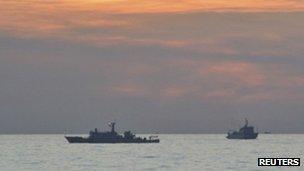China needs 'consistent policy' on South China Sea
- Published

Philippine and Chinese vessels remain at a disputed shoal, two weeks after a stand-off began
China needs a ''consistent policy'' on the South China Sea if it is to resolve disputes, a new report says.
The International Crisis Group said ''conflicting mandates'' and ''lack of co-ordination'' among Chinese agencies had stoked tension in the region.
Philippine and Chinese vessels remain locked in a two-week stand-off at a remote shoal which both sides claim.
Meanwhile annual joint military exercises between the US and the Philippines are continuing in the area.
While the South China Sea conflict has been a longstanding one, the number of maritime disputes has ''increased dramatically'' in recent years, the report by the think-tank notes.
This has led to ''concerns that China, Vietnam and the Philippines are growing more assertive on this issue, endangering regional stability'', it says.
In China, many government agencies are using this issue to bolster their power and budget, it says.
Repeated proposals for ''a more centralised mechanism'' have not been met, it adds, and the foreign ministry ''does not have the authority or resources to manage other actors''.
''More immediate conflict risks lie in the growing number of law enforcement and paramilitary vessels playing an increasing role in disputed territories without a clear legal framework,'' it says.
The findings are based on interviews with officials, academics, diplomats, journalists and industry experts in fishing, tourism and oil, from China, South East Asia, Taiwan, Japan and the US.
'Meddling and intervention'
Six countries claim competing sovereignty over areas in the South China Sea, parts of which are believed to contain significant deposits of oil and gas.
Along with China and the Philippines, they are Brunei, Malaysia, Vietnam and Taiwan.
China's claim includes almost the entire South China Sea, well into what the UN Convention on the Law of the Sea recognises as the 200-mile-from-shore Exclusive Economic Zones of other claimants.
That has led to occasional flare-ups and to competition to occupy islands, reefs and sandbars.
The latest incident sparked when a Philippines warship found eight Chinese fishing vessels at the Scarborough shoal - which both sides claim - when it was patrolling the area on 8 April.
When navy personnel boarded the Chinese fishing vessels, they found a large amount of illegally-caught fish and coral, Manila said.
Two Chinese surveillance ships then arrived in the area, preventing the navy from making arrests.
Attempts to resolve the stand-off have not yet been successful. The Philippine warship has been replaced by a coast guard vessel and the Chinese fishermen have gone, but two Chinese vessels remain there.
China has also expressed anger at the annual US-Philippines military exercises, due to run until 27 April.
This year they are taking place off Palawan, near the disputed Spratly islands which both Manila and Beijing claim. The joint exercises involve some 7,000 troops, including more than 4,000 from the US.
With China asserting its claims more aggressively the US has been strengthening old friendships in the region, says the BBC's John Sudworth reporting from the South China Sea on the exercises.
This week, three US ships are also in Vietnam for a five-day naval exchange involving salvage and disaster training. No live fire drills are planned.
On Saturday, the official paper of the People's Liberation Army published a commentary lashing out at the US for ''meddling and intervention''.
"Anyone with clear eyes saw long ago that behind these drills is reflected a mentality that will lead the South China Sea issue down a fork in the road towards military confrontation and resolution through armed force," the commentary said.

- Published23 April 2012
- Published16 April 2012
- Published16 April 2012
- Published8 January 2012
- Published9 February 2012